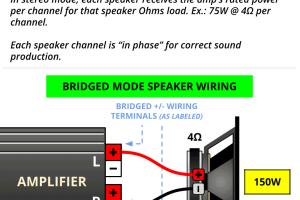Ultimate Guide to Bridging an Amplifier for Superior Sound Quality

-
Quick Links:
- Introduction
- What is Bridging an Amplifier?
- Benefits of Bridging an Amplifier
- How to Bridge an Amplifier
- Step-by-Step Guide to Bridging an Amplifier
- Common Mistakes to Avoid When Bridging
- Case Study: Bridging an Amplifier in a Home Theater
- Expert Insights and Tips
- FAQs
- Conclusion
Introduction
In the world of audio engineering, bridging an amplifier can significantly enhance your sound system's performance. This comprehensive guide will walk you through the ins and outs of amplifier bridging, ensuring you achieve superior sound quality.
What is Bridging an Amplifier?
Bridging an amplifier involves using two amplifier channels to drive a single load (speaker) for increased power output. This technique can improve sound quality and dynamics, especially in high-performance audio systems.
Benefits of Bridging an Amplifier
- Increased Power Output: Bridging allows for more power to be delivered to a single speaker.
- Improved Sound Quality: Enhanced dynamics and clarity can be achieved.
- Better Speaker Control: Bridged amplifiers can drive speakers more effectively.
- Cost-Effective Upgrade: Instead of buying a new amplifier, bridging can maximize your current setup.
How to Bridge an Amplifier
Bridging an amplifier isn’t a one-size-fits-all process. It requires understanding your specific amplifier’s capabilities and the speaker’s requirements. Here’s a basic overview:
- Check your amplifier's manual for bridging instructions.
- Ensure that the speaker impedance matches the bridged output.
- Use the correct wiring configuration.
Step-by-Step Guide to Bridging an Amplifier
Follow these detailed steps to bridge your amplifier safely:
Step 1: Gather Your Tools
You will need:
- Wire cutters and strippers
- Screwdrivers
- Speaker wire
- Multimeter (optional)
Step 2: Turn Off All Power
Before starting, ensure all devices are powered off to prevent any electrical hazards.
Step 3: Locate the Bridging Instructions
Refer to the amplifier’s user manual to find the specific bridging instructions. Each amplifier may have a unique configuration.
Step 4: Connect the Speaker
Connect the speaker using the designated bridging terminals, typically labeled as "BRIDGED" or "B".
Step 5: Test the Setup
After connecting, turn on the amplifier and gradually increase the volume to ensure everything is functioning correctly.
Common Mistakes to Avoid When Bridging
- Not Checking Impedance: Always check your speaker's impedance to avoid damage.
- Incorrect Wiring: Ensure you follow the correct wiring diagram for your amplifier.
- Overloading the Amplifier: Ensure the amplifier can handle the load.
Case Study: Bridging an Amplifier in a Home Theater
In a recent project to enhance a home theater system, an audio enthusiast bridged a 100-watt amplifier to drive a 4-ohm subwoofer. The result was a significant improvement in low-frequency response and overall sound clarity.
Expert Insights and Tips
Audio engineer John Doe notes, "Bridging amplifiers can transform your listening experience, but it’s crucial to understand your equipment fully. Always prioritize quality over quantity." Consider experimenting with different configurations for optimal results.
FAQs
1. Can any amplifier be bridged?
No, only amplifiers designed for bridging can be safely utilized in this manner.
2. What happens if you bridge an amplifier not designed for it?
This could lead to equipment damage or poor audio quality.
3. How can I tell if my amplifier is bridged?
Look for a switch or connection labeled "BRIDGED" in the amplifier's manual.
4. Does bridging affect sound quality?
Yes, bridging can enhance sound quality by delivering more power to the speaker.
5. What is the ideal impedance for a bridged setup?
Most amplifiers require a minimum of 4 ohms when bridged, but always check the manual.
6. Can I bridge more than two channels?
Some multi-channel amplifiers allow bridging of multiple channels, check the specifications.
7. Is there a difference between mono and bridged output?
Yes, mono output uses one channel for both speakers, while bridging uses two channels for increased power.
8. How do I maintain my bridged amplifier?
Regularly inspect connections and ensure proper cooling to prevent overheating.
9. What type of speakers work best with bridged amplifiers?
Speakers that have a compatible impedance with the bridged amplifier output.
10. Can I use a bridged amplifier for my car audio system?
Yes, bridging amplifiers can be very effective in car audio systems for powering subwoofers.
Conclusion
Bridging an amplifier can unlock the full potential of your audio setup. By following this guide, you can enhance your sound quality and enjoy a more dynamic listening experience. Remember to always prioritize safety and consult your equipment manuals for specific instructions.
External References
- Understanding Bridged Amplifiers - Audioholics
- How to Bridge an Amplifier - Crutchfield
- Understanding Amplifier Bridging - Sound on Sound
Random Reads
- Simple ways to get youtube premium for free
- How to trash donate or sell old television
- How to transfer photos from iphone to ipad
- Download summertime saga android apk
- How to remove toolbars
- How to remove user ps4
- How to remove or permanently delete books from your kindle
- How to fit two twin beds in a small room
- How to fit and install a bath panel
- How to use xbox 360 controller on xbox one